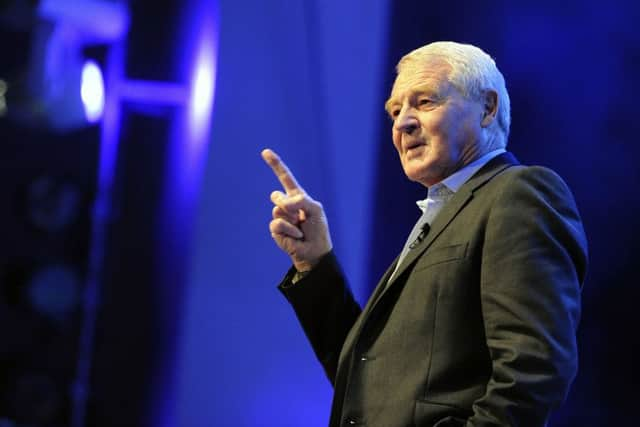Big names welcome fans at Book Festival launch


In fact, many of those queuing were younger readers in brightly coloured rain-wear, eagerly anticipating an appearance by Gruffalo creator Julia Donaldson.
For grown-ups, the festival got under way in the Spiegeltent with screenwriter Frank Cottrell Boyce, who worked with Danny Boyle on the opening ceremony for the London Olympics and is also an acclaimed novelist for children, talking about his first collection of short stories. He read with Scotland’s own Carl MacDougall, presenting his first collection of stories for some years, Somebody Always Robs the Poor.
Advertisement
Hide AdAdvertisement
Hide AdCottrell Boyce explained that his collection did not yet have a name as he was currently locked in a legal battle with the makers of the board game Scrabble over his proposed title, Triple Word Score. He did confirm,m however, that the title story, about a man whose son goes missing after walking out during a game of Scrabble, was to be made into a film starring Bill Nighy.


And he transported us, briefly, to Liverpool in November 1639, where a young man called Jeremiah Horrocks set up a telescope he had bought for two shillings and sixpence and became the first observer of the passage of Venus across the sun. This is what literature does so well: transports a reader across time and space; gathers up something seemingly insignificant – a dark spot moving across a lens – and gives it meaning; gives voices to those who do not have voices of their own.
MacDougall echoed that thought, saying he was drawn to those who did not have a voice, which was echoed again, later the same day, by leading Chinese novelist Liu Zhenyun. He explained that his interest as a writer was in the lives of ordinary Chinese people, that the writer needed to be “the person who listens when no one else is listening”.
In his most recent novel I Did Not Kill My Husband, a woman comes up with a way to get round China’s one-child policy, but ends up the wronged party when the plan backfires. Over the course of 20 years, she takes her fight for justice up through the ranks of Chinese bureaucracy, undeterred by the fact that no one will listen to her. Through the experience of this fearless Everywoman, the machinations of the State are exposed.
As well as hearing new stories, literature is about connecting with the great stories of the world. Just how many people across the world connect with the story of Hamlet became clear when Dominic Dromgoole, then artistic director of the Globe Theatre, came up with a plan to stage Shakespeare’s play in every country in the world. The story of their adventures is told in Dromgoole’s book, Hamlet, Globe to Globe.


From a Roman amphitheatre in Oman to a tin hut in a Syrian refugee camp, and on one memorable night in a theatre in Mexico City when the cast were so ill they had to keep a rotation of buckets in the wings, they discovered that the Prince of Denmark was an excellent traveller. “Hamlet shows different faces in different directions,” Dromgoole explained. “It can challenge, console, provoke, inspire, depending on the political and societal moment.”
Since his retirement from the House of Commons, Paddy Ashdown has forged a new career as a historian and is now the author of nine books. He said he was particularly drawn to the period of the Second World War because it was possible to see how ordinary people behave in a time “when history sweeps them up and requires them to become extraordinary”.
Advertisement
Hide AdAdvertisement
Hide AdA sell-out crowd in the Book Festival’s main theatre sat rapt as he told the story of his latest book, Game of Spies, which he wrote after discovering the papers of Roger Landes, the gifted British agent who was parachuted twice into occupied France, to build, and then later rebuild, the Resistance network in Bordeaux. His story is told alongside that of Andre Grandclement, the Resistance leader who eventually betrayed his compatriots, and Friedrich Wilhelm Dohse, the remarkable Gestapo officer who emerges as, perhaps, the kindest character of the three. Though it sounds like a barn-storming novel, Ashdown was at pains to remind us that every detail of the story was true.
Meanwhile, novelist Paula Hawkins expressed a similar interest in the way in which ordinary people “are capable of great things and terrible things, given the right circumstances”. Hawkins, whose novel The Girl on the Train has sold five million copies worldwide and was made into a film starring Emily Blunt, has made the bold move of following her blockbuster with a very different book.
Into The Water is set in Northumberland, a “labour of love” she has been working on for several years.The story of two estranged sisters, one of whom dies in mysterious circumstances, and of the (fictional) town in which they live where “everyone has a secret”, it is an ambitious book with multiple narratives and time shifts.
Hawkins dedicates her book to “trouble-makers”, particularly female ones, a title which would likely be worn with pride by Labour MP Jess Phillips. Since she was elected in 2015, she has enjoyed speaking her mind, and reaps the consequences every day from the trolls on Twitter. Speaking about her book, Everywoman: One Woman’s Truth About Speaking the Truth, she paid tribute to Harriet Harman (who will be at the Book Festival on 27 August) for paving the way for women in politics “to be funny, kind and normal. She had to be cleverer, smarter, more serious (than the men)”.
However, she added that, with the gradual erosion of the benefits system, tax credits and childcare provision under the Conservative government, the ladder which enabled her to become an MP had now been kicked aside. “If I was now a 21-year-old, just out of university, had never had a job, and had just become pregnant, there is no way that, in 10 years time, I could become an MP.”
The day concluded with a theatrical experiment, the first of three events at the Book Festival organised by David Greig, the artistic director of the Lyceum Theatre, under the banner Playing With Books. In this case, a playwright (Stef Smith), a director (Eve Nicol), a composer (Catriona Reilly) and two actors (John Kielty and Frances Thorburn) had three days of rehearsal time to explore Amy Liptrot’s memoir, The Outrun.
A performance of scenes based on the first four chapters was followed by a panel discussion, opening up the process in which a text, while being upheld and respected, can be transformed into something new. Liptrot herself, visibly moved, described the result as “a duet between my words and Stef’s”.